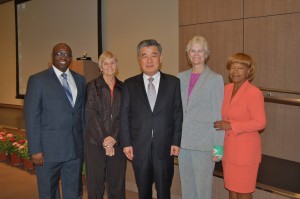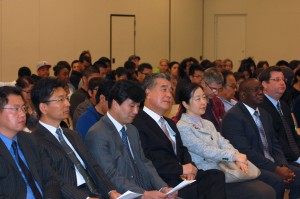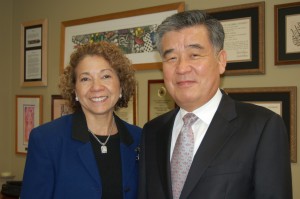Can you name any nation that has sealed its bond with another nation by successfully sharing ideals, especially freedom, liberty, democracy and prosperity? Such was a question that the Honorable Yeon-sung Shin, consul general of the Republic of Korea in Los Angeles, posed to an audience of more than 100 students, faculty, and staff on Feb. 8 in Loker Student Union.
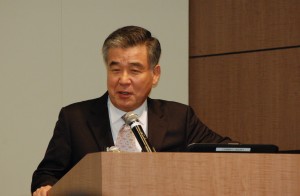
Answering the rhetorical question, Shin shared an overview of the evolving relationship between the U.S. and Republic of Korea (South Korea), beginning with the Korean War more than six decades ago.
Using a term Shin said he borrowed from President Barack Obama, he discussed the “Natural Partnership,” examining the opportunities and challenges the two nations have jointly experienced, and the outlook for their future, especially regarding strides in environmental and economic issues.
Beginning as a military alliance, Shin described the U.S.-South Korea relationship as “more comprehensive than an alliance,” because of the many shared socioeconomic ideals. He pointed to the U.S.-Korea Free Trade Agreement that was approved by the U.S. Congress and South Korea’s parliament at the end of 2011 as an example. According to Shin, delegations from both governments met last week in Los Angeles to discuss details and procedures, before full implementation, which could possibly occur before the end of this month.
“It’s a win-win agreement, which took almost five years of negotiations. It’s going to improve and increase our traffic in goods, services, personnel, and technology information,” said Shin in an interview before his lecture. “It will lead to the abolition of tariffs between our two countries. If I quote studies from the United States government agencies, it will increase the trade volume by more than $10 billion yearly. It will create hundred of thousands of high-paid quality jobs in the U.S. and in Korea.”
The two nations already share economic benefits. The U.S. is Korea’s fourth-largest trade partner (behind China, the European Union as a whole, and Japan) and alternatively, Korea is the seventh-largest trade partner to the U.S., with $90.2 billion in trade volume.
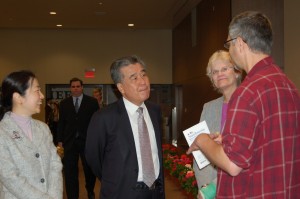
Professor of Asian Pacific studies Jung Sun Park, who helped arrange the visit of the consul general, said despite the increasing popularity of Korean popular culture (called the Korean Wave) in recent years among young people in the U.S., they tend to know little about Korea and its people beyond that.
“I began to hear from my students about their love for K-pop and Korean dramas recently,” said Park. “Yet, despite the larger than 10 percent of student body of Asian Pacific heritage on our campus, and despite our location in L.A., which is the home of the largest Asian/Asian Pacific American population in the U.S., our students’ understanding of Korea seems to be at the minimal level.
“The images of Korea has long been tainted with stereotypes such as the Korean War and, more recently, the North Korean nuclear issues,” she continued. “But, the realities in contemporary South Korea are far from the stereotypes. It’s one of the most (if not the most) highly wired countries in the world, which explains its globally prominent position in the IT-related fields, with a strong economy and vibrant culture,” Park said.
Park said the lecture provided students with a unique opportunity to learn about the Korea-U.S. relations from a Korean diplomat’s point of view. During coverage of Shin’s visit on campus by LA 18, an Asian language television station serving Southern California’s Asian populations, a news reporter seemed to confirm that assertion, saying it was rare for the consul general to give a lecture at a university.
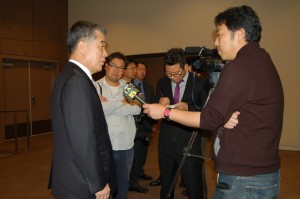
“Students usually learn about international relationships through books and the media,” said Park. “But the lecture added depth and a new dimension to students’ learning through the first-person account of an experienced diplomat and a chance to directly address their questions to him.”
One such student, Pamela Prieto, got the chance to ask Shin a rather complex question: “President Bush had previously placed and named North Korea as a member of the ‘Axis of Evil,’ which many argue accelerated their nuclear proliferation. Considering North Korea’s withdrawal from the Nuclear Non-Proliferation Treaty, and withdrawal from the International Atomic Energy Agency, what might it take for North Korea to decrease its nuclear proliferation, and to accept management and supervision from the International Atomic Energy Agency?
Saying the main concern in addressing this question is the status of the new leader, Shin said one cannot assume and speculate too much, since North Korea has just recently acquired a new dictator.
“Consul General Shin’s lecture and presentation was a worthy educational experience, because it allowed us students to hear and learn about Korea and East Asia first hand. There are not many events on campus that focus on Asian studies or culture,” said Prieto, a senior who has a double major (philosophy and political science) and double minor (humanities and Asian Pacific studies).
Prieto, who be among students representing the university Feb 16-18 at the Harvard National Model United Nations 2012, said the consul general’s visit would be very helpful to her as she takes on the role of a delegate at the competition.
“It was great to see how a diplomat stays in character to satisfy and fulfill the policies, economics, and politics of its country,” said Prieto. “Consul General Shin also showed that it is necessary to represent a country with dignity, knowledge, and honor, which he completely did. It was also helpful, because I’m certain that South Korea is going to be represented at the Model UN conference, and I will now know, even more so, if the student delegate is in character.”
Describing them as “young talent,” Shin said students such as Prieto have the best opportunity to help promote the U.S.-Korea relationship by being engaged.
“I am very happy that [CSU Dominguez Hills] provides an Asian Pacific studies program,” said Shin. “This region where Korea is located is a very important partner with the United States.”
During his lecture, Shin touched on a number of global issues, such as the need for world nations to commit to green practices in order to grow their economies, climate change, energy security. and the fight against terrorism, the proliferation of weapons of mass destruction, poverty, and disease.
He also acknowledged the looming threat of North Korea as a “nuclearizing” nation. He stated that Korea remains the only nation in the world that is divided, and posed another question, “Should Korea be unified?”
More photos:
